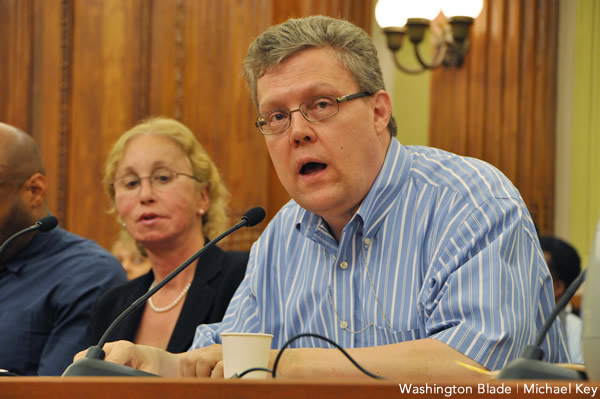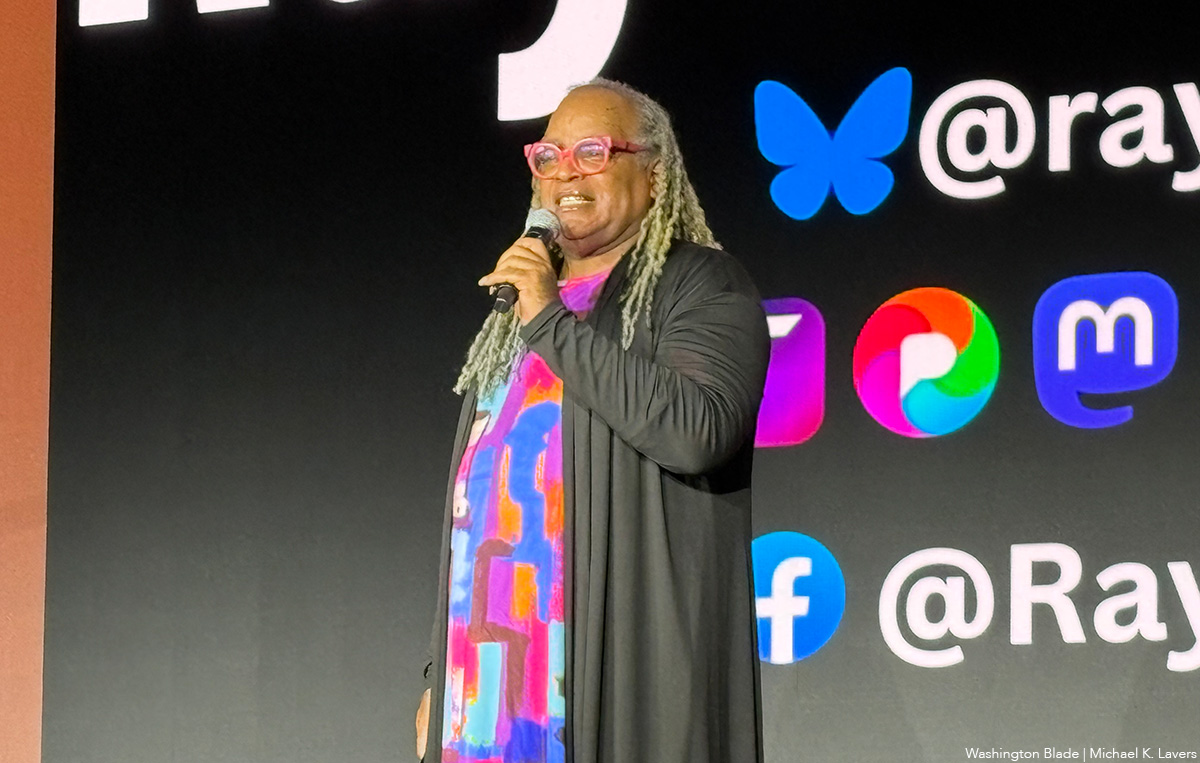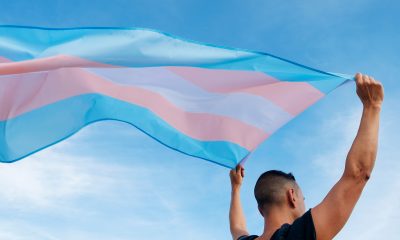Local
Third activist released from Kameny lawsuit
Attorneys for estate say picket signs, other property still missing


Gay activist, Richard Rosendall, has been released from the Kameny estate lawsuit. (Washington Blade file photo by Michael Key)
Gay activist Richard Rosendall, a longtime friend of the late gay rights leader Frank Kameny, testified in court on May 11 that he has returned several items he “borrowed” from Kameny’s house shortly after Kameny died last October.
Rosendall appeared in a courtroom at the D.C. Superior Court’s Probate Division in response to a show cause order obtained by attorneys representing Timothy Clark, the personal representative and main heir of Kameny’s estate.
Through his attorneys, Clark has charged in a lawsuit that Rosendall and three other Kameny friends and associates removed without permission documents and other property belonging to the Kameny estate from Kameny’s house in Northwest Washington shortly after Kameny died last Oct. 11.
“After the death of Franklin Edward Kameny, I borrowed, and held in my possession and control, certain personal properly lawfully belonging to the Estate of Franklin Edward Kameny,” Rosendall stated in a sworn affidavit submitted to the court two days prior to the hearing.
He identified in the affidavit and on the witness stand the items borrowed as “a copy of Dr. Kameny’s 1961 brief for the Supreme Court of the United States; a letter to or from [U.S. Supreme Court] Justice [Lewis] Powell; several letters between Dr. Kameny and an Army official concerning [the Gay and Lesbian Activists Alliance’s] wreath-laying ceremonies at Arlington Cemetery; a box of business cards; and three or four books.”
Two of the other three named in the lawsuit, Charles Francis and Bob Witeck, have returned items they acknowledged belonging to the estate. Rosendall testified at the May 11 hearing that he helped Francis carry 17 boxes filled with papers and other items from Kameny’s house, which he said Francis placed in a storage facility for safekeeping. Rosendall has said Clark, who lived in the house with Kameny for 19 years, gave them permission to enter the house.
Upon their return of the property last month, attorneys for the estate dismissed Francis and Witeck from the lawsuit.
Similar to Rosendall, Francis and Witeck have said they took possession of the items to ensure they remain safe and properly preserved during a period of confusion following Kameny’s death. Each has said they planned all along to return the items to the estate. Witeck has said the only items he took were several photographs.
Rosendall testified that he returned the items he borrowed to Francis, who returned them to the Kameny estate last month.
“The Estate of Dr. Franklin E. Kameny is satisfied that Richard J. Rosendall has returned the items that Mr. Rosendall removed from Dr. Kameny’s home shortly after Dr. Kameny’s death,” said Glen Ackerman, one of the attorneys representing Clark and the Kameny estate, in a statement to the Blade on Monday.
“However, there are still a number of important historical items still missing from the Estate, including Dr. Kameny’s collection of buttons, handmade picket signs and posters,” Ackerman said in the statement. “The Estate is attempting to recover these missing historically significant assets as a part of the probate process and to make certain that Dr. Kameny’s wishes as recorded in his Last Will and Testament are carried out fully.”
In his will, Kameny bequeathed his papers to the Library of Congress while leaving all other possessions, including his house and car, to Clark.
In response to questions at the May 11 court hearing by Kameny estate attorney J. Max Barger, Rosendall disputed claims by the estate that Clark believes as many as 100 picket signs were taken from the house after Kameny’s death. Rosendall told Barger he doubted that many picket signs had been in the house.
Kameny and his fellow gay activists used the picket signs in their historic gay rights demonstrations outside the White House and other government buildings in the early 1960s, the first such demonstrations ever held.
Barger and Ackerman told Judge John Campbell, who presided over the hearing, that the picket signs and buttons, which are inscribed with gay rights messages, have an important historic value and must be accounted for during the probate process for the estate.
Rosendall testified that he has possession of one of the picket signs, which he said Kameny gave permission for him to take several years prior to his death. He said Kameny also gave him a signed copy of The Homosexual Citizen, a publication of the Mattachine Society of Washington, which Kameny co-founded in 1961.
Mindy Daniels, Rosendall’s attorney, expressed concern during the hearing that the estate was confusing items that Kameny gave to Rosendall and others with items belonging to the estate. She noted items given away by someone prior to their death are not part of their estate after the person dies.
Ackerman told Campbell that Francis, Witeck, Rosendall and Marvin Carter, another Kameny friend, had not responded to earlier efforts by the estate to obtain from them an inventory of the items they allegedly took from Kameny’s house following Kameny’s death.
Daniels said the estate never contacted Rosendall about these items until it filed suit against him in March. Ackerman said the estate did make attempts to reach Rosendall and the other three men.
The estate named Carter as a defendant in one of the lawsuits seeking the return of items taken from Kameny’s house and petitioned the court to order him to appear at the May 11 show cause hearing, but Carter did not show up for the hearing. Barger told the court the estate wasn’t able to locate him to serve him a summons to appear at the hearing.
Carter hasn’t returned calls from the Blade seeking comment on the case. As head of the local LGBT charitable group Helping Our Brothers and Sisters (HOBS), Carter arranged for the group to provide financial assistance and support for Kameny in the last years of his life.
“I don’t know where we are going with this,” the judge told the attorneys at the hearing. “You can say to these folks give the items back,” Campbell said to Ackerman and Barger. “They can say we did. You can say they didn’t…But we’re not sitting in a criminal court. I can’t convict someone of theft.”
Campbell called on all parties in the case to cooperate and do their best to come up with an inventory of all property that belongs to the state.
He ruled that Rosendall fulfilled the requirements of the show cause order and ordered that he be released from the order. He denied a request from Ackerman and Barger that he issue a “non-disparagement” order prohibiting Rosendall from saying disparaging things about Clark or the Kameny estate. Ackerman told Campbell that an attorney representing Francis made derogatory remarks and false accusations against Clark earlier this year.
Campbell said that as a probate judge he did not have authority to issue such an order.
“I always hope that people will be civil,” he said.
The judge said he could not issue a ruling for Carter because the attorneys for the estate had not been able to serve him with a summons calling on him to appear in court.
Ackerman said the estate would file a motion to dismiss its lawsuit against Rosendall, leaving Carter as the only one of the four with the lawsuit still pending against him. The lawsuit calls on the court to require that Carter disclose what, if any, items he may have that belong to the estate and that he return any such items. Carter has yet to file a response to the lawsuit.
In his affidavit filed with the court, Rosendall, vice president for political affairs of the Gay and Lesbian Activists Alliance, made these additional assertions:
“I hereby affirm that I have destroyed or returned any and all copied, digitized, or otherwise electronically or physically duplicated property belonging to the Estate, including but not limited to: personal papers, photographs, documents, memorabilia and other miscellaneous items of tangible personal property. I further affirm that I have not caused the duplication and/or digitization, whether electronic or physical, of said property of the Estate to third parties.”
Local
Local LGBTQ groups, activists to commemorate Black History Month
Rayceen Pendarvis to moderate Dupont Underground panel on Sunday

LGBTQ groups in D.C. and elsewhere plan to use Black History Month as an opportunity to commemorate and celebrate Black lives and experiences.
Team Rayceen Productions has no specific events planned, but co-founder Rayceen Pendarvis will attend many functions around D.C. this month.
Pendarvis, a longtime voice in the LGBTQ community in D.C. will be moderating a panel at Dupont Underground on Sunday. The event, “Every (Body) Wants to Be a Showgirl,” will feature art from Black burlesque artists from around the country. Pendarvis on Feb. 23 will attend the showing of multimedia play at the Lincoln Theatre that commemorates the life of James Baldwin.
Equality Virginia plans to prioritize Black voices through a weekly online series, and community-based story telling. The online digital series will center Black LGBTQ voices, specifically trailblazers and activists, and contemporary Black queer and transgender people.
Narissa Rahaman, Equality Virginia’s executive director, stressed the importance of the Black queer community to the overall Pride movement, and said “Equality Virginia is proud to center those voices in our work this month and beyond.”
The Capital Pride Alliance, which hosts Pride events in D.C., has an alliance with the Center for Black Equity, which brings Black Pride to D.C. over Memorial Day weekend. The National LGBTQ Task Force has no specific Black History Month events planned, but plans to participate in online collaborations.
Cathy Renna, the Task Force’s director of communications, told the Washington Blade the organization remains committed to uplifting Black voices. “Our priority is keeping this at the forefront everyday,” she said.
The D.C. LGBTQ+ Community Center is also hosting a series of Black History Month events.
The D.C. Public Library earlier this year launched “Freedom and Resistance,” an exhibition that celebrates Black History Month and Martin Luther King Jr. It will remain on display until the middle of March at the Martin Luther King Jr. Memorial Library at 901 G St., N.W.
District of Columbia
U.S. Attorney’s Office drops hate crime charge in anti-gay assault
Case remains under investigation and ‘further charges’ could come

D.C. police announced on Feb. 9 that they had arrested two days earlier on Feb. 7 a Germantown, Md., man on a charge of simple assault with a hate crime designation after the man allegedly assaulted a gay man at 14th and Q Streets, N.W., while using “homophobic slurs.”
But D.C. Superior Court records show that prosecutors with the Office of the U.S. Attorney for D.C., which prosecutes D.C. violent crime cases, charged the arrested man only with simple assault without a hate crime designation.
In response to a request by the Washington Blade for the reason why the hate crime designation was dropped, a spokesperson for the U.S. Attorney’s office provided this response: “We continue to investigate this matter and make no mistake: should the evidence call for further charges, we will not hesitate to charge them.”
In a statement announcing the arrest in this case, D.C. police stated, “On Saturday, February 7, 2026, at approximately 7:45 p.m. the victim and suspect were in the 1500 block of 14th Street, Northwest. The suspect requested a ‘high five’ from the victim. The victim declined and continued walking,” the statement says.
“The suspect assaulted the victim and used homophobic slurs,” the police statement continues. “The suspect was apprehended by responding officers.”
It adds that 26-year-old Dean Edmundson of Germantown, Md. “was arrested and charged with Simple Assault (Hate/Bias).” The statement also adds, “A designation as a hate crime by MPD does not mean that prosecutors will prosecute it as a hate crime.”
Under D.C.’s Bias Related Crime Act of 1989, penalties for crimes motivated by prejudice against individuals based on race, religion, sexual orientation, gender identity, disability, and homelessness can be enhanced by a court upon conviction by one and a half times greater than the penalty of the underlying crime.
Prosecutors in the past both in D.C. and other states have said they sometimes decide not to include a hate crime designation in assault cases if they don’t think the evidence is sufficient to obtain a conviction by a jury. In some instances, prosecutors have said they were concerned that a skeptical jury might decide to find a defendant not guilty of the underlying assault charge if they did not believe a motive of hate was involved.
A more detailed arrest affidavit filed by D.C. police in Superior Court appears to support the charge of a hate crime designation.
“The victim stated that they refused to High-Five Defendant Edmondson, which, upon that happening, Defendant Edmondson started walking behind both the victim and witness, calling the victim, “bald, ugly, and gay,” the arrest affidavit states.
“The victim stated that upon being called that, Defendant Edmundson pushed the victim with both hands, shoving them, causing the victim to feel the force of the push,” the affidavit continues. “The victim stated that they felt offended and that they were also gay,” it says.
District of Columbia
Capital Pride wins anti-stalking order against local activist
Darren Pasha claims action is linked to his criticism of Pride organizers

A D.C. Superior Court judge on Feb. 6 partially approved an anti-stalking order against a local LGBTQ activist requested last October by the Capital Pride Alliance, the D.C.-based LGBTQ group that organizes the city’s annual Pride events.
The ruling by Judge Robert D. Okun requires former Capital Pride volunteer Darren Pasha to stay at least 100 feet away from Capital Pride’s staff, board members, and volunteers until the time of a follow up court hearing he scheduled for April 17.
In his ruling at the Feb. 6 hearing, which was virtual rather than held in-person at the courthouse, Okun said he had changed the distance that Capital Pride had requested for the stay-away, anti-stalking order from 200 yards to 100 feet. The court records show that the judge also denied a motion filed earlier by Pasha, who did not attend the hearing, to “quash” the Capital Pride civil case against him.
Pasha told the Washington Blade he suffered an injury and damaged his mobile phone by falling off his scooter on the city’s snow-covered streets that prevented him from calling in to join the Feb. 6 court hearing.
In his own court filings without retaining an attorney, Pasha has strongly denied the stalking related allegations against him by Capital Pride, saying “no credible or admissible evidence has been provided” to show he engaged in any wrongdoing.
The Capital Pride complaint initially filed in court on Oct. 27, 2025, includes an 18-page legal brief outlining its allegations against Pasha and an additional 167-page addendum of “supporting exhibits” that includes multiple statements by witnesses whose names are blacked out.
“Over the past year, Defendant Darren Pasha (“DSP”) has engaged in a sustained, and escalating course of conduct directed at CPA, including repeated and unwanted contact, harassment, intimidation, threats, manipulation, and coercive behavior targeting CPA staff, board members, volunteers, and affiliates,” the Capital Pride complaint states.
In his initial 16-page response to the complaint, Pasha says the Capital Pride complaint appears to be a form of retaliation against him for a dispute he has had with the organization and its then president, Ashley Smith, last year.
“It is evident that the document is replete with false, misleading, and unsubstantiated assertions,” he said of the complaint.
Smith, who has since resigned from his role as board president, did not respond to a request by the Blade for comment at the time the Capital Pride court complaint was filed against Pasha.
Capital Pride Executive Director Ryan Bos and the attorney representing the group in its legal action against Pasha, Nick Harrison, did not immediately respond to a Blade request for comment on the judge’s Feb. 6 ruling.



















